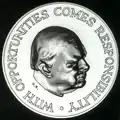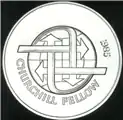Winston Churchill Memorial Trusts
Winston Churchill Memorial Trusts (WCMT) are three independent but related living memorials to Sir Winston Churchill, based in the United Kingdom, Australia, and New Zealand. They exist for the purpose of administering Churchill Fellowships, also known as Churchill Travelling Fellowships, to provide an opportunity for applicants to travel overseas to conduct research in their chosen fields.
| Founded | 1 February 1965 |
|---|---|
| Focus | Enhancing communities by providing opportunities for individuals to expand knowledge in other countries |
| Location |
|
| Origins | Living memorial to Sir Winston Churchill |
Area served | UK, Australia, New Zealand |
| Method | Travel Fellowships |
| Endowment | GB£2.75 million (UK:1965)[1]:2 |
| Website | wcmt.org.uk churchilltrust.com.au dia.govt.nz |


The Trusts were established in 1965, after the death of Churchill, by a combination of public subscription and government contributions.
History
General
In 1962 Prince Philip, Duke of Edinburgh asked Churchill what type of memorial he would like the world to remember him by. He liked the idea of an unusual type of memorial, to be set up after his death, and suggested something like the Rhodes Scholarships, but available to everybody, on a wider basis. The concept was developed jointly by the English-Speaking Unions of the Commonwealth and of the United States. Several countries planned a nationwide appeal after Churchill's to set up a National Churchill Trust. The plans were kept secret at Lady Churchill’s request until after his death.[2]
The Trusts were founded to "perpetuate and honour the memory of Sir Winston Churchill" by administering the award of travelling fellowships known as Churchill Fellowships.[1]:9
An attempt in 1964 by then Canadian Prime Minister Lester B. Pearson and George A. Drew to launch a fourth Trust in Canada did not come to fruition, in part due to the illness and death of the latter.[1]:5
UK
The UK Trust was founded on 1 February 1965, the day after Churchill's funeral.[1]:1 Elizabeth II extended her Royal Patronage to the Trust in 1965.[1]:2
Australia
Before Churchill's death, planning for the fund-raising appeal for the establishment of a Churchill Trust in Australia continued under the code name Operation “G” (for Gratitude), under the leadership of (later Sir) William John Kilpatrick.[3] Immediately on the announcement of Churchill's death on the 24 January 1965, a nationwide appeal for funds was launched by Prime Minister Robert Menzies, with Kilpatrick as Chairman of the Appeal Committee. Commonwealth and State Governments as well as Australian companies and individuals donated generously. The Returned Services League performed a nationwide doorknock on Sunday 28 of February, which raised £911,000. A total of £2,206,000 was raised, and the Winston Churchill Memorial Trust founded to administer the funds.[2]
Description
General
The recipients organise their own travel and undertake their own research. Upon their return, they submit a report to the Trustees. Once their report is accepted, they are formally installed as Fellows and receive their insignia, consisting of a specially minted Churchill Medal, at a national award ceremony. Applicants must be citizens of the respective country and the research must necessitate foreign travel.
An implication taken from the award of a Fellowship is that the recipient is a leader or has potential leadership in their field of endeavour, and that the Fellowship will strengthen their usefulness to society. They are encouraged to promote the Fellowships, encouraging others to apply, and thus perpetuating the memory of Churchill.
UK
The UK Trust, situated in London,[4] award 150 travelling fellowships to fund successful applicants' travel for four to eight weeks anywhere in the world, researching their chosen topic among global leaders in their field. Upon return, the organisation helps the Fellows to share their learning with professions and communities across the country. They are not academic research grants, but intended for practical research into real-world issues, covering eight themes: Arts and culture; community and citizenship; economy and enterprise; education and skills; environment and resources; health and wellbeing; governance and public provision; and science and technology.[5]
In 2019 the Patron of the Winston Churchill Memorial Trust (UK), Her Majesty Queen Elizabeth II, agreed for the letters "CF" (for "Churchill Fellow") could be used by Churchill Fellows from the UK. This is intended as an honorific to mark the contribution of Churchill Fellows to national life.
Australia
The Australian WCMT has chapters with regional committees in each state and territory,[6] with the national office at Churchill House in Canberra. All directors and regional committee members serve in an honorary capacity.[2]
The aim of the fellowships is to "provide an opportunity for Australians to travel overseas to conduct research in their chosen field that is not readily available in Australia...with further opportunity in their pursuit of excellence for the enrichment of Australian society". There are no prescriptions as to theme or topic.[2]
New Zealand
The New Zealand WCMT is administered by the Department of Internal Affairs.[7] Lieutenant-General Sir Jerry Mateparae, Governor-General of New Zealand, is patron of the Trust, which assists fellows to travel overseas for a period of from three weeks to three months to investigate topics in their trade, industry, profession or business, that will help them to increase their contribution to the community and their field back in New Zealand.[8]
Notable fellows by country and year
United Kingdom
Year Fellow Occupation /
professionPurpose / project / findings Location of study 1967 Dr. Mary Remnant Musicologist Brought back to life, in reconstructed form, the sound of medieval musical instruments depicted on church walls and in carvings across Europe.[9] Europe 1976 Dr. Jane Wilson-Howarth Ecologist Discovered numerous species that were new to science and named one, a springtail, Troglopedetes churchillatus in honour of Churchill.[10][11] Nepal 1981 John Elkington Business author Environmental industry and its use in implementing the World Conservation Strategy. United States[12] 1982 Nick Danziger Travel artist and author Travelling on foot and by traditional local transport, Danziger traversed from western Europe to China, and published Danziger’s Travels as a result.[13][14][15] Western Europe and China 1988 Charles Farthing Medical doctor Studied AIDS at the Bellevue Hospital in New York[16] United States 1989 Serge Lourie Housing Association Chair Studied urban renewal and housing in order to help tackle the housing crisis in the United Kingdom France and United States 2000 Paul Darke Academic and Disability rights activist Exploring disability access to pilgrimages and shrines[17] France and Spain 2016 Amy Varle Housing consultant Pioneering strategies for 21st century homeless prevention and response United States 1991 Robin Drinkall Entrepreneur The Waste Industry - collection, disposal and recycling Japan
Australia
Year Fellow Occupation /
professionPurpose / project / findings Location of study 1972 Lionel Gilbert Lecturer and curator To study the educational use of museums in the UK[18] UK 1972 Rob Morrison Zoology researcher To examine the administration of Field Study Centres and the courses offered in same[19] UK 1984 Roger McNeice Numismatist To study developments in the conservation and preservation of coins and medals.[20] UK 2008 Dr Elizabeth Grant Architect, anthropologist and academic, University of Adelaide To study the design of prisons for Indigenous prisoners [21] Denmark, US, Canada, New Zealand 2009 Sarah Maddison Social scientist and academic To study models of Indigenous representation[22] US and Canada 2009 Shan Raffel Firefighter To study emergency planning, preparation and response to fires and other incidents in large tunnels[23] Germany, Denmark, Norway, Austria, Switzerland, Sweden, Canada, USA 2009 Corinne Unger Scientist To study leading practice abandoned mine rehabilitation and post-mining land use[24] Austria, Germany, United Kingdom and Canada 2016 Lindy W. Cayzer Botanist To unlock critical taxonomic information on the Pittosporaceae in overseas herbaria[25] Indonesia, Malaysia, Singapore, Netherlands, France, UK 2019 Jared Thomas Writer and museum curator To investigate colonised people's interpretative strategies in permanent gallery displays[26] New Zealand, US, Canada, Norway
New Zealand
Year Fellow Occupation /
professionPurpose / project / findings Location of study 1973 Don Merton Conservationist Study the management of endangered species. US and Europe
See also
References
- Bath., Alan A. (1985). A survey of the work of the Winston Churchill Memorial Trust in the operation of the scheme of Winston Churchill Travelling Fellowships 1966–1983. London: Winston Churchill Memorial Trust. ISBN 978-0-9510028-0-3.
- "About the Churchill Trust". Winston Churchill Memorial Trust (Australia). Retrieved 2 November 2019.
- Damian, Veltri. "Kilpatrick, Sir William John (Bill) (1906–1985)" (Published first in hardcopy 2007 ed.). Australian Dictionary of Biography, National Centre of Biography, Australian National University. Retrieved 2 November 2019.
- "Winston Churchill Memorial Trust (UK)". Archived from the original on 2 August 2019. Retrieved 10 May 2009.
- "What we do". Winston Churchill Memorial Trust (UK). Archived from the original on 4 September 2019.
- "Contact us". Winston Churchill Memorial Trust (Australia). Retrieved 2 November 2019.
- "New Zealand Winston Churchill Memorial Trust". Retrieved 10 May 2009.
- "The Winston Churchill Memorial Trust of New Zealand". International Churchill Society. In Finest Hour (161), Winter 2013-14. Retrieved 2 November 2019.CS1 maint: others (link)
- Christopher Page (October 1987). "Mary Remnant, English Bowed Instruments from Anglo-Saxon to Tudor Times. Oxford, Clarendon Press, 1986. xxv + 182 pp". Early Music History, Volume 7. Cambridge University Press: online 05 December 2008: 243–248. doi:10.1017/S0261127900000607.
- Wilson, J.M. (1982). "A review of world Troglopedetini (Collembola) including an identification table and descriptions of new species". Cave Science: Transactions of the British Cave Research Association. 9 (3): 210–226.
- "Fellows Today – Dr. Jane Wilson-Howarth". Retrieved 10 May 2009.
- "John Elkington 1981". Winston Churchill Memorial Trust. Retrieved 28 May 2016.
- Danziger, Nick (1988). Danziger's travels: beyond forbidden frontiers. London: Paladin. ISBN 978-0-586-08706-0.
- "Nick Danziger – Bio". Retrieved 10 May 2009.
- "Fellows Today – Nick Danziger". Retrieved 10 May 2009.
- "Charles Farthing". News. British HIV Association. 9 April 2014. Retrieved 12 May 2014.
- "Exploring disability access to pilgrimages and shrines | Winston Churchill Memorial Trust". www.wcmt.org.uk. Retrieved 30 September 2020.
- Australian College of Educators (2012). "Dr. Lionel Gilbert OAM". Australian College of Educators. Retrieved 17 October 2012.
- "Morrison, Robert's profile". www.churchilltrust.com.au. Winston Churchill Memorial Trust. Retrieved 8 January 2017.
- "Roger McNeice OAM". Winston Churchill Memorial Trust. Retrieved 12 July 2015.
- "investigate the design of correctional facilities for Indigenous prisoners – New Zealand, Canada, Denmark". Retrieved 6 January 2015.
- Maddison, Sarah (21 September 2010). "To study Indigenous representation organizations in Canada and the United States" (PDF). The Winston Churchill Memorial Trust, Australia. Retrieved 16 January 2012.
- https://www.churchilltrust.com.au/fellows/?page=4&cat=9
- https://www.churchilltrust.com.au/media/fellows/UNGER_Corinne_2009.pdf
- "Cayzer, Lindy's Fellowship Profile | WINSTON CHURCHILL MEMORIAL TRUST". www.churchilltrust.com.au. Retrieved 25 April 2020.
- "2019 Churchill Fellowship Award Recipients". Churchill Trust. Retrieved 22 November 2019.